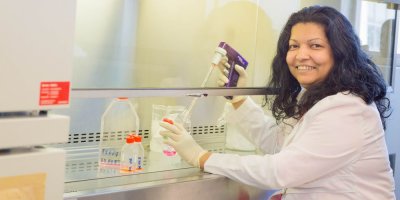Rushika Perera ’95

Rushika researches how dengue virus interacts with its human host and mosquito vector to replicate and spread.
Describe your career path from GC to now. I did research all 4 years at GC and this really helped me pursue a PhD at Purdue, where I learned to use multiple disciplines in research on alphaviruses. After 3 years post-doctoral training at the Univ. of California at Irvine and again at Purdue as a Research Scientist I got the most perfect job at CSU running a research lab and mentoring undergraduate and PhD students and post-doctoral fellows. All the many years of hard work were completely worth it.
What is a typical work day like? In addition to planning/designing/doing experiments, I also write grants, progress reports, review papers submitted by others, write and review my own papers for publication, have meetings with my students and faculty colleagues, and prepare for classes I teach. I also take time to dance, go to the gym, etc. I do fun things and get a lot of work done as well. Time is elastic.
What skills are important in your work? 1) Most important is the ability to interact with people, discuss exciting ideas, and be able to listen. 2) Overcome failure. Many experiments fail; few work. Learn to be excited when you fail, and use that challenge to fix the problems. 3) Hard work. Research sometimes means long hours and multi-tasking, which is easy when working on exciting research. I have often slept in the lab. 4) Writing skills are absolutely required for reports, publishing research, and to get grants funded in order to convince others about your exciting research. 5) Oral communication for constantly talking with others and giving presentations. 6) Critical thinking to look at someone’s research and evaluate it. This is how science improves and moves forward.
What do you like about your work? I absolutely love working on a serious human health problem. Also, viruses fascinate me. Everything I do daily is new and could result in a new antiviral or vaccine to fight this deadly disease.
What is the best career advice you’ve received? On my first day at GC a friend advised me to talk with Stan Grove about research, which I started even before my first class. That set me on this career path and life has been extremely exciting ever since. If you’re interested in experiencing something, go for it and jump in. If you don’t know what you want, explore several options. I spent many summers doing internships in plant biology, genetics, yeast biology, cancer research, etc. until I knew I liked virology. My career advice for chemistry majors is that you can do research in biology, biochemistry, or cell biology at major research universities, pharmaceutical companies, or national research labs. Explore your options; possibilities are unlimited since everything requires chemistry. I owe my success to the great beginnings at GC.




